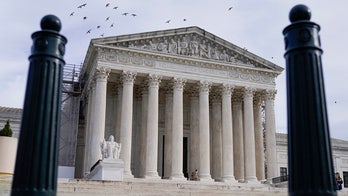
Jan. 17, 2012: Democratic National Committee Chairwoman Debbie Wasserman Schultz speaks during a news conference at Bank of America stadium in Charlotte, N.C. (AP)
Democrats are moving the final day of their national convention to the 74,000-seat Bank of America Stadium, a move that will allow organizers to fit more spectators -- and also potentially sell pricey tickets to donors in the scramble for cash.
The decision to move the entire affair from the Time Warner Cable Arena in Charlotte, N.C., to the home of the Carolina Panthers on the final day echoes the itinerary for the 2008 convention -- in which organizers moved the nomination acceptance speech to Invesco Field in Denver so more people could attend.
As the motivation for the 2012 decision unfolds, organizers are trying to hold themselves to a higher standard than in the past, prohibiting lobbyist, corporation and PAC donations, as well as individual donations over $100,000. The host committee is still trying to raise $37 million.
Democratic National Committee Chairwoman Debbie Wasserman Schultz acknowledged last fall that the new rules would "make our job harder."
So the organizers have had to get creative. Among other tactics, they reportedly have sought funding from charitable foundations tied to corporations. And, according to a recent Bloomberg story, they looked at the Bank of America Stadium as a way to lure contributors -- by dangling the venue's first-rate skybox seats to the generous.
Convention officials told FoxNews.com on Tuesday that the organizers "have not made a decision on how the skyboxes will be used."
"However," an official said, "decisions about convention planning are made by how to include the most people, not money. Holding the final night at Bank of America Stadium will allow us to include tens of thousands of Americans."
Party officials stressed that the decision to move the final day's festivities was rooted in a desire to let more people see President Obama's speech.
"We are underlining the mission of this convention -- to engage Americans," convention committee CEO Steve Kerrigan said in a statement.
"We wanted to find a way to truly make this convention different than any other in history. We want this convention to be about more than just the pageantry and speeches you see on television," Wasserman Schultz said.
Regardless of the reason, the decision could have its drawbacks -- the backdrop to the president's speech of Bank of America Stadium is low-hanging fruit for critics looking to undercut Obama's populist message.
Bank of America accepted a $45 billion bailout, which the company later repaid, from the federal government. The bank also took heat from consumers and officials last year for planning a $5 monthly debit card fee, a plan it abandoned after the backlash. Vice President Biden called the company "incredibly tone deaf" over the proposal.
Convention officials brushed off the notion that the choice of venue might cause problems.
"Convention officials are not concerned about who has naming rights to the stadium. President Obama has a record to run on of passing Wall Street reform, and it will be clear in September which candidate is willing to stand up for the middle class," an official said.
The site of the final night's festivities wasn't the only change of plans unveiled Tuesday. Organizers also announced that the convention would be shortened to three days from four. What would have been the first day, Labor Day, will instead be designated "as a day to celebrate the Carolinas, Virginia and the South at Charlotte Motor Speedway," according to a convention statement.
Obama's nomination speech is Sept. 6.
Republicans are not holding themselves to the same ban on lobbyist and corporate contributions for their convention in Tampa, Fla.
But as Democrats try to follow the new finance rules, Obama's practices from the 2008 campaign continue to come under scrutiny. A group called the U.S. Citizens Association on Monday called for the Federal Election Commission to promptly release the results of an audit of Obama's campaign which reportedly began shortly after Obama took office.
The association, in calling for the "immediate release" of the findings, cited a 2008 story in The Washington Post that detailed how the campaign was accepting donations via prepaid credit cards, which could potentially be used to skirt donation caps. The group also noted that Obama's 2008 campaign received nearly half of its donations from people giving under $200, the threshold for having to disclose a donor's identity, while GOP nominee Sen. John McCain received about a quarter of his donations in that range.
"We're in 2012 now. Is the Obama campaign still accepting questionable contributions and where are they coming from?" Lance Davis, director of the group, said in a statement.
The Obama campaign said the FEC review is not yet complete.
"The FEC is conducting an ongoing routine review to determine if they have any questions with the information reported. Given that there was an historic number of contributors and contributions -- nearly four million and over nine million respectively -- this takes time," the campaign said.




